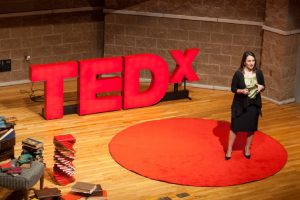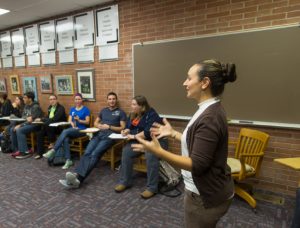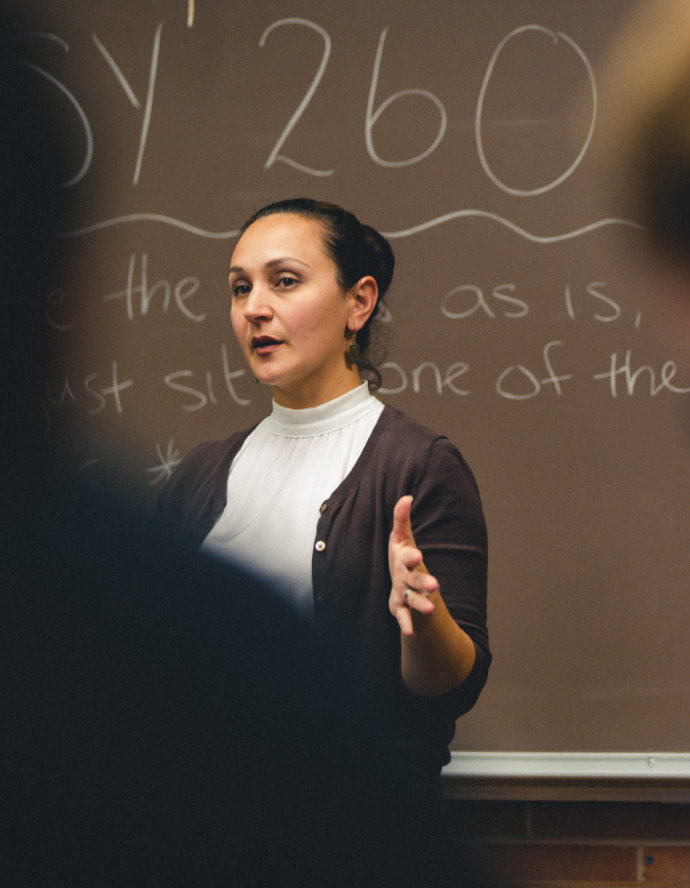How can a better understanding of trauma and mental health improve our criminal justice system and lead to improved outcomes for at-risk youth?
It’s been a career-long question for Amanda Zelechoski J.D., Ph.D., Former Assistant Professor of Psychology, director of graduate admissions in Valpo’s psychology and counseling graduate programs, and program advisor for the University’s law-psychology dual degree graduate programs.
Through her classes, research, and collaboration with outside agencies, Professor Zelechoski seeks to share what psychologists know about trauma with the criminal justice system in hopes of improving the systemic experiences of at-risk youth to reduce their future risk of engaging in violent behavior.
Professor Zelechoski previously served as a consultant to the Philadelphia Police Department to develop guidelines and training protocols to help lessen trauma for children whose parents or guardians are arrested.
“We wanted to target minimizing the trauma to kids by working with police officers to pay attention to details,” she says. “If an officer arrests a parent in the middle of the day, then the kid comes home from school and has no idea what happened to his or her parent. This isn’t often a part of traditional police training.”
Professor Zelechoski also focused on trauma-related training to address mental health issues within law enforcement. According to the Butler Center for Research at the Hazelden Betty Ford Foundation, in 2010, 11 percent of male police officers working in urban areas and 16 percent of female officers reported alcohol use levels deemed “at-risk” by the National Institute on Alcohol Abuse and Alcoholism. Everyday stress and trauma on the job can lead to burnout, and Professor Zelechoski worked with officers to understand their own risks and how to access resources and diffuse situations that increase stress.
“I love the work I do with police departments,” she says. “People will ask me if I regret going to law school since I don’t practice law. But I understand both worlds. Having worked in jails, prisons, and forensic settings — I understand their primary concerns for safety and that individuals and departments have different needs.”
The intersection of trauma and the criminal justice system guided Professor Zelechoski’s presentation at Valpo’s inaugural TEDxValparaisoUniversity event in March 2016, themed “The Power of &.”
“There’s a concept used in psychology called dialectical thinking that allows people to view issues from multiple perspectives. It can help someone understand they don’t have to think in black and white. There are a lot of ways to be multiple things. You can be doing the best you can and still be better,” she says. “And when we think of who’s a victim and who’s a perpetrator, it tends to be as one or the other.
“Many perpetrators are victims also. So we need to think about what is this cycle and how do we understand it in order to help people when we see warning signs, to get them out of these cycles.”
She also has worked with the Valparaiso Police Department and says the partnership has led to excellent opportunities for student research. They’ve analyzed differences in policing between the United Kingdom and the United States and have surveyed officers about their exposure to traumatic events.
 Professor Zelechoski’s eyes light up when she talks about student research opportunities, although she knows that for many students, research classes are not their favorites because it can be difficult at times to see how research is applied. But once that connection is made, students can become excited and want to continue learning and experimenting.
Professor Zelechoski’s eyes light up when she talks about student research opportunities, although she knows that for many students, research classes are not their favorites because it can be difficult at times to see how research is applied. But once that connection is made, students can become excited and want to continue learning and experimenting.
“In clinical settings, students will have questions along the way. ‘Do some types of trauma make it more likely a juvenile will commit a crime?’ ‘If parents have committed a crime, are their children more likely to do so?’ Working in the real world sparks these questions, and then there’s a light bulb — research can answer our questions,” she says.
Professor Zelechoski says students come to her with questions and theories and want to analyze data to see if they were right. “They become interested in the process along the way, and then they stay involved,” she says. “A critical piece is bringing them to conferences, and there’s a huge funding need for student scholarships in this area. Doors are opened and futures are changed when they have the opportunity to attend, network, present, and learn. It’s an amazing tool for students to take pride in their work.”
Students often continue working with Professor Zelechoski in multiple courses and projects. Rose Clapper Leuhrs ’16 M.A., who graduated in August 2016, served as Professor Zelechoski’s lab coordinator for two years and currently is conducting research with her while she applies for doctoral programs.
“Dr. Z has been an invaluable mentor to me,” Rose says. “She has supported me through academic and professional crises and motivates me to continue inching toward my goals even when they feel miles away. I always know she will be right behind me with an award-winning pep talk.”
Professor Zelechoski knows her own experiences at Valpo would not be possible without philanthropic support. As a recipient of the 2016–2017 Philip and Miriam Kapfer Endowed Research Award, Professor Zelechoski had the opportunity to take leave during the fall 2016 semester to commit herself to research. Philip and Miriam Kapfer are parents to alumni Paul Kapfer ’89, J.D., and Dr. Stephanie Kapfer ’91, and the bi-annual award is funded by an endowment created by the Kapfer family. The goals are to highlight the value of current research in higher education, specifically in the arts and sciences, and to develop new insights and strategies for teaching and learning in higher education that will be of value to other researchers, teachers, and students.
Her project, “Activities for Teaching Psychology and Law Courses: A Guide for Instructors,” focuses on experiential learning activities that can be applied in undergraduate psychology and law classes. The guide isn’t textbook-specific and can be adapted for online, in-person, or hybrid classes. Handouts, videos, grading rubrics, learning objectives, and discussion guides are all included.
The project grew from a passion for experiential learning and a curiosity as to its return on investment. Professor Zelechoski partnered with Valparaiso High School to talk with teens about forensic psychology and different disorders, and those students then came in and displayed behavior related to a specific disorder while Valpo students analyzed the behavior and conducted assessments. Along with her research partners and co-authors, Christina Riggs Romaine and Melinda Wolbransky, who are friends from graduate school who teach at other universities, Professor Zelechoski compared results from classes with these activities to those without and found the experiential learning component yielded significant results.
“Having fun in the classroom became part of the research,” Professor Zelechoski says. “One of the neatest things about Valpo is that there is as much support for scholarship of teaching and learning as there is for what some might consider traditional scientific research. That’s part of why the faculty here are so great in the classroom. Workshops, grants, resources to keep improving as a teacher — most research-intensive institutions don’t have that.”
One of the students involved in this research, Olivia Gorman ’15, ’17 M.A., has learned the value of applied research while helping advance her scholarship through the experiential learning research as well as projects focused on trauma and recidivism.
“Professor Zelechoski has been a mentor to me, providing support, information, advice, and encouragement,” Olivia says. “While she’s an excellent teacher, it’s outside the classroom where one can see her true impact; she sets aside countless hours to talk and meet with a variety of students. I owe all of my success to her support and constant guidance, and I know she will continue to inspire myself and many others by being an outstanding teacher and excellent mentor.”
Olivia attended the 2015 American Psychology-Law Society Conference in San Diego to present the students’ perspective on experiential learning in psychology and law courses. Following the conference, colleagues began asking Professor Zelechoski for activities to use in their own classes, and the project expanded to writing a book for instructors.
Her belief in the value of experiential learning draws from Professor Zelechoski’s experience determining a career path. As an undergraduate, she was a psychology major and considering both law school and graduate school. She shadowed a forensic psychologist, which brought both areas together. Then, summer volunteer work gave Professor Zelechoski her first exposure to children who have experienced trauma during interactions with the legal system.
“I worked with children in Atlanta who were physically and sexually abused and saw them getting stuck in a system that wasn’t working for them,” she says. The experience led her to pursue a law-psychology dual degree graduate school program, with hopes of working to improve the intersection between the mental health and criminal justice systems.
 Every initiative Professor Zelechoski launched at Valpo has received some form of donor support. Previously, she and Dawn Jeglum Bartusch, associate professor and chair of sociology and criminology, created a course titled “Inside-Out Prison Exchange: Rethinking Crime, Justice, and Behavior from the Inside Out.” Funding from the Creative Work and Research Committee and the College of Arts and Sciences Dean’s Fund allowed them to become certified instructors to offer the course through the national Inside-Out Prison Exchange program, which pairs 15 Valpo students with 15 incarcerated individuals to learn with and from one another in a course that takes place inside Westville Correctional Facility.
Every initiative Professor Zelechoski launched at Valpo has received some form of donor support. Previously, she and Dawn Jeglum Bartusch, associate professor and chair of sociology and criminology, created a course titled “Inside-Out Prison Exchange: Rethinking Crime, Justice, and Behavior from the Inside Out.” Funding from the Creative Work and Research Committee and the College of Arts and Sciences Dean’s Fund allowed them to become certified instructors to offer the course through the national Inside-Out Prison Exchange program, which pairs 15 Valpo students with 15 incarcerated individuals to learn with and from one another in a course that takes place inside Westville Correctional Facility.
“None of these opportunities for students would happen without donor support,” Professor Zelechoski says. “This isn’t about my salary. This is about creating opportunities that change the course of students’ lives. When you invest in faculty, you’re absolutely investing in students. We can’t continue to provide these opportunities without the resources and protected time to do so. This University has been so generous to me. And it keeps faculty here. This is where I want to be. I have opportunities to enrich what I do here. When donors invest in people, it shows that they want us to be here and are willing to give us the resources to be optimally successful.”
Support for faculty is a priority of Forever Valpo: The Campaign for Our Future. Endowed funds secured by Forever Valpo will reward faculty for their scholarship and accomplishments, compensate them at competitive levels, and provide them with exceptional opportunities for professional advancement.
Professor Zelechoski is developing a forensic assessment tool for use in child custody evaluations, which is funded by a Wheat Ridge Ministries – O.P. Kretzmann Memorial Fund Grant. For that project, Professor Zelechoski is working with Arizona forensic psychologists, David Weinstock and John Moran, and graduate students in the clinical mental health counseling program are serving as research assistants. Together, they will create a structured guide for clinicians doing family evaluations to ensure that they are assessing empirically derived and relevant factors. In addition, Professor Zelechoski is working on a manuscript that will detail a recently completed pilot study at the Porter County Juvenile Detention Center examining the relationship between trauma and recidivism for incarcerated juveniles.
Professor Zelechoski lives in Valparaiso with her husband, three sons, and yellow Labrador retriever. She loves bringing her children to events on campus and enjoys raising them in the University community.
This is about creating opportunities that change the course of students’ lives. When you invest in faculty, you’re absolutely investing in students.

